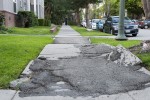The Los Angeles City Council unanimously approved a $1.4 billion sidewalk repair program Tuesday that will shift sidewalk maintenance responsibilities from the city to property owners.
The city council approved a series of programs that allow landowners to initiate repairs for sidewalks maimed by tree roots and increase accessibility by installing features such as curb ramps, according to the Los Angeles mayor’s office. The program dictates the city will reimburse landowners for half the cost of approved repairs.
The program, a 30-year initiative beginning this July, is part of a settlement between the City of Los Angeles and Mark Willits, a quadriplegic man who filed a class action lawsuit against the city in 2010. The lawsuit claimed that damaged sidewalks infringed on disabled residents’ rights under the Americans with Disabilities Act, said Andrew Thomas, executive director of the Westwood Village Improvement Association. In the settlement, the plaintiffs did not seek personal monetary compensation but instead requested the sidewalks be fixed.
Inaugural funding for the program is estimated to be $31 million and will gradually increase each year to more than $63 million during the last four years of the program.
Some Westwood community leaders said the new program will expedite sidewalk repairs because landowners can now initiate them.
Thomas said the association, also known as the Westwood Village Improvement Association, has repaired thousands of square feet of sidewalk using its own funds for five years. He said he expects the combined resources between the Westwood community and Los Angeles will double the output of repairs.
“We’ve been trying to find a partner in our repair efforts, and we found one with the city,” he said.
Sandy Brown, president of the Holmby-Westwood Property Owners Association, said trees planted in the 1920s have matured and their roots are now dismantling walkways in Westwood. She said landowners were responsible for repairing adjacent sidewalks in the past, so tasks were accomplished more quickly, but repair efforts have been lackluster since the city took over the responsibility in the 1970s.
“People ask our association about the (new rebate) program all the time,” she said. “I think people are ready to repair their sidewalks and have just been waiting for the city to get back into this.”
Phillip Gabriel, owner of Scrubs Unlimited in Westwood Village, said he thinks sidewalks need repair because the city does not properly maintain the irrigation of trees. He added the city should fully pay for repairs the first time around, after which the rebate program could be instated for future repairs.
Gabriel added he does not plan to take advantage of the rebate because his storefront is not affected by severe damage that warrants repair.
Some students who live in off-campus apartments said the risk posed by damaged sidewalks is especially pertinent in residential streets, because most students walk to and from class.
David Liu, a third-year undeclared student who lives in the North Village, said students can easily hurt themselves while walking on damaged sidewalks, especially during evening hours.
“At night when you’re not really paying attention to the ground, the damage becomes most problematic,” he said. “If you’re skateboarding or riding a scooter or even walking, those cracks and bumps become serious dangers.”
Leon Chang, a third-year biochemistry student who also lives in the North Village, said he has to be very vigilant while he commutes to campus. He urged businesses and landowners to repair adjacent sidewalks as soon as possible.
“(Landowners) should definitely take advantage of this rebate plan if they care about the safety of the people who pass by their properties every day,” he said.
